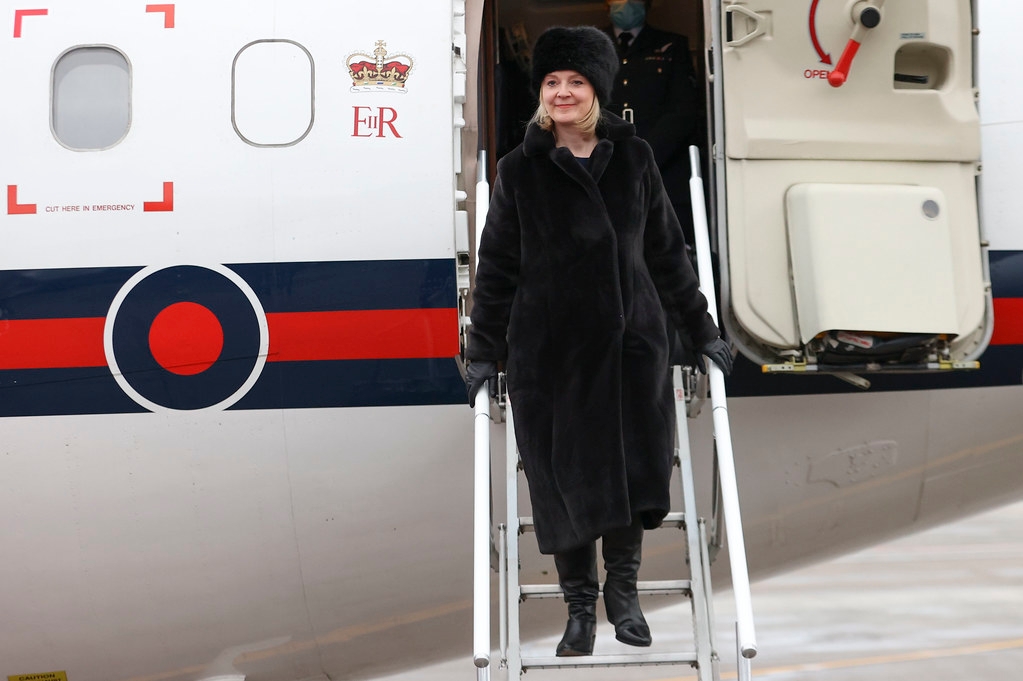As cabinet members were lining up last week to tell Boris Johnson to resign, one major actor was absent from the drama. Liz Truss was in Indonesia at a G20 summit and missed the fun. She flew back the day after Johnson announced his resignation, knowing that if she makes it to the final stage of the leadership campaign, she has a very good chance of becoming the next prime minister.
She is the longest-serving cabinet member, having been environment minister, Lord Chancellor, a treasury minister, trade secretary and now Foreign Secretary. To her admirers, she’s a ‘true blue’ Tory who can inspire a following with her brand of liberty-loving conservatism. She loves the party base, who in turn seem to love her. Her speeches at party conference often have large queues on the way in and she has been voted Tory activists’ favourite more times than any other minister in the Johnson era.
Her critics says she is a populist, a ‘human hand grenade’ and a political lightweight whose love of Instagram exposes her as unserious. ‘If Truss is the answer, we’re asking the wrong question,’ says one former minister. Her detractors – most commonly One Nation Tories – take an ‘anyone but Truss’ stance on the leadership. ‘But colleagues will see her creativity and grip of policy – and she is absolutely relentless,’ says one admirer. ‘Once something gets into her head as needing to be done she never lets it go. What’s the difference between Liz and a rottweiler? The rottweiler eventually lets go.’
I met Truss on a trip to Paris earlier this month, in relatively tranquil days when there were few signs that Johnson was about to implode. Her message to the French during the trip – her first since she became foreign secretary last year – was a plea to get the ‘barnacles off the boat’ by sorting the Northern Ireland Protocol. Last month she published legislation allowing the government to tear up the rules in the original Brexit deal. Her fight over the Northern Ireland Protocol, she says, shows how serious she is about making Brexit work.

Her position as a Brexit hardliner is quite a journey for a former Remainer who used to be a card-carrying Liberal Democrat. As a child in Leeds, she would be taken to anti-nuclear and anti-Thatcher demonstrations by her mother. Her Lib Dem phase, she says, was a teenage mistake. ‘I joined the Liberals under the false premise that they believed in freedom and low taxes; it turned out not to be true and then I moved to the Conservative party in my early twenties.’
And Brexit? ‘If I could vote now, I would vote to leave the European Union. I was a reluctant Remainer. I was loyal to the prime minister at the time, David Cameron, but since the referendum I’ve put my shoulder to the wheel in terms of delivering the opportunities of Brexit. As trade secretary I negotiated a lot of trade deals, and we went much further than the European Union was ever prepared to in our deal with Australia.’
During the negotiations for that Australian trade deal, Truss faced plenty of opposition from her own side. Her supporters refer to the cabinet protectionists in those arguments – Michael Gove, George Eustice and Zac Goldsmith – as the ‘axis of evil’.
What about the nicknames she has been given by Tory colleagues – usually referring to chaos or destruction? It was when Truss was a minister in the Department for Education under Gove that she acquired the ‘human hand grenade’ nickname. ‘Everywhere she went things would blow up in chaos,’ says an aide in the department at the time. ‘It was coined by Dominic Cummings,’ an ally of Truss responds. ‘He doesn’t like her positive and outward-looking view of the world and it ultimately reflects the fact she delivers and isn’t afraid to ruffle a few feathers doing that.’
Her detractors – most commonly One Nation Tories – take an ‘anyone but Truss’ stance on the leadership

What does Truss make of the name? ‘What they say about the ‘human hand grenade’ – which I think was first aired in The Spectator in a particularly appalling cartoon of me – I take it as a backhanded compliment in that I do get stuff done. Since I’ve been at the Foreign Office, we have secured the release of Nazanin (Zaghari-Ratcliffe) and Anoosheh (Ashoori) from Iran. We’ve refocused on foreign policy, on the network of liberty, and are taking a much tougher stand on both Russia and China.’
On the trans debate, Truss says the age of consent is the key factor. ‘If you are under 18, you shouldn’t be able to undertake irreversible treatments when you don’t have the decision-making capabilities to do that. Once you’re 18, as a free adult, it is absolutely your decision about how you choose to live your life.’
She also takes a clear stance on the language around gender. This week, a row broke out after Suella Braverman appeared to accuse her leadership rival Penny Mordaunt of falsely claiming responsibility for axing gender-neutral language from a maternity law bill during her time in the Cabinet Office. Instead, Truss is one of the figures credited with fighting to change the wording in the bill from ‘pregnant people’ to ‘women’. ‘I’ve been very clear in my time in government that women are women and that that is the way we should word things, whether we’re talking about pregnant women or menstruation or other specific issues relating to women, I think it’s important that words mean what they are,’ she says.
On the Online Safety Bill, which would oblige tech firms to censor ‘legal but harmful’ material, she says she worries about free speech implications. ‘We need to make sure that those without the decision-making capabilities, particularly the under-18s, are protected from harmful content. But I think where you have adults talking to each other, it is important that we don’t have censorship. So it is about getting the balance right.’

If she does end up facing Rishi Sunak in the final runoff – in which the Tory party members will vote on the winner – the pair are likely to repeat a row that they had in cabinet last year over taxes. Sunak wanted to raise National Insurance to fund social care and clear the NHS backlog. Truss spoke against the rise, instead suggesting that growth could provide the money or debt could take the strain if necessary. Sunak is said to have remarked: ‘I am genuinely shocked if anyone thinks the answer to the question is more borrowing.’ Truss was backed at the time by Jacob Rees-Mogg, then the leader of the House of Commons. Rees-Mogg now supports her leadership campaign, which could be a sign that Truss is favoured by the Thatcherite supply-side Tories.
Her pitch for No. 10 is simple: to be the most convincing tax-cutter in the contest and the person who can beat the former chancellor. ‘I opposed these tax rises from the start and I spoke out against the tax rises at the time. So I’m not a Johnny-come-lately to this agenda,’ she says when we meet again this week in her parliamentary office. ‘I’m a low-tax Conservative. I believe that the right thing for us, in the very difficult global economic situation we face, is to not be raising taxes.’
What sets her apart from the other Tory hopefuls pledging tax cuts is her plan to pay for them. ‘Covid was a one-off crisis. The debt that we accumulated as a result of that, the £400 billion we spent, should be seen as a long-term debt – like a war debt – and needs to be longer-term,’ she says. ‘I don’t agree with the Treasury orthodoxy of immediately seeking to pay that back and balance the books and damage economic growth.’
In other words, she would borrow to finance her tax cuts. Borrowing, she says, that would spur extra growth (and, by extension, tax receipts). She would cut the size of government too. ‘I’d have a temporary moratorium on the Green Energy Levy to enable businesses and industry to thrive while looking at the best way of delivering net zero,’ she says. ‘I also support far deeper implementation of free ports, so that they are genuinely low-tax. Then low planning zones: new investment zones around key parts of the United Kingdom with much clearer planning rules so people can get on with building straight away to generate those jobs and opportunities. I want to level up in a Conservative way.
‘We’ve got five million people economically inactive – we need to get those people into work. We need to reform welfare. We need to focus government on what we need to do, rather than trying to do everything. I spent two years at the Treasury as chief secretary, I’ve got experience of spending control. In this leadership race I’ve got supporters like Kwasi Kwarteng and Simon Clarke, who are committed to that agenda as well.’
Cuts and welfare reform: not the easiest political sell. But tough arguments are necessary, she says, for anyone serious about a smaller state and lower tax. ‘I am the person capable of driving those changes through because they will be unpopular. They will be opposed by vested interests. But I will drive those changes through,’ she says. And time is a factor, so radicalism is urgent. ‘We’ve got two years until the general election. People need to see by then that things are improving and the economy growing.’
A more flattering version of the human hand grenade nickname dates from when she was schools minister: ‘Miss Dynamite’, for her habit of dealing with obstacles by blasting through them. And if her methods upset people along the way this time? ‘Well, in life and in politics you can’t always please everyone all the time. I’m in politics to get things done and move things forward.’







Comments